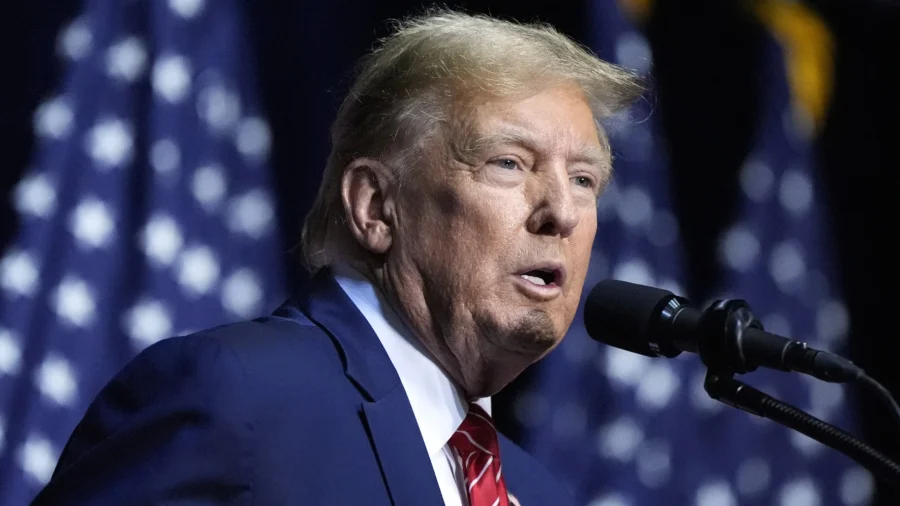New York Supreme Court Justice Juan Merchan denied two motions from former President Donald Trump’s defense attorneys on March 26. They had requested permission to file new motions and for case documents and correspondence to be made public.
In one order, Justice Merchan pointed out that the filing of new motions is permitted, but only after a one-page pre-motion had been submitted to the court and approved first. In the other, he pointed to a previous protective order he entered which requires some personal information in the case files to be redacted.
“The Court advises counsel that it expects and welcomes zealous advocacy and creative lawyering,” Justice Merchan wrote. “However, the Court also expects those advocates to demonstrate the proper respect and decorum that is owed to the courts and its judicial officers and to never forget that they are officers of the court. As such, counsel is expected to follow this Court’s orders.”
New Motions
The judge, who this week set an April 15 trial date, started the order by criticizing the defense’s attempts to “repeatedly” delay the trial. He noted that on March 7, the defense tried once again when they filed a motion to adjourn the trial based on presidential immunity.
“The motion was filed a mere two and a half weeks before the scheduled trial date,” Justice Merchan wrote. The next day, he issued an order prohibiting the filing of new motions without first obtaining permission from the court by filing a one-page “pre-motion letter.”
Defense attorneys had argued that the order was a violation of the Sixth Amendment right to a fair trial because it could block the party from filing new motions.
The judge explained the order was meant to “efficiently manage the case at bar” by giving the parties necessary time to file “valid” arguments.
He pointed out he had “the inherent authority to exercise discretion in the management of its docket,” rejecting the Sixth Amendment argument as “without merit.”
“As of the date of this Order, no party has been denied the ability to file a motion,” the judge added.
The judge recapped exchanges between parties and the court after his March 8 order, criticizing the defense for prematurely attaching motions as “exhibits” to their pre-motion letter and warning the parties not to cross “the line between zealous advocacy and willful disregard of [the Court’s] orders.”
Public Case
The judge also denied the defense’s request to “unseal and docket all pleadings, orders, and substantive written communications that have involved the Court and the parties, including communications sent by letter and email” and require simultaneous public access of all such future documents.
Justice Merchan pointed out the need to have some information redacted in this case, which has prevented or delayed the public posting of some court documents.
He pushed back on the defense’s claims that the public is being “shielded” from any information that would normally be made available on a public docket.
“In fact, the Unified Court System has taken up the task of posting substantive pleadings, decisions and orders on the nycourts.gov website, a step, as far as this court is aware, which appears to be unique for a criminal matter in New York State Supreme Court — Criminal Term,” the judge wrote.
As of Feb. 15, the judge’s orders have been made public on the court website, a public information officer confirmed, though older correspondence is not available. A number of high profile cases have been given prominence on the public information page.
Justice Merchan added that the defense was free to attach communications they believe should be made public to court filings and noted the defense has done so.
April 15 Trial
On March 25, Justice Merchan held a contentious hearing where the defense accused the Manhattan district attorney of prosecutorial misconduct, and the judge said the defense had brought no basis for this.
Justice Merchan said there was a “pattern” of the defense interpreting information differently than he reads it, and this has been going on for “several months” now.
The district attorney has charged President Trump with 34 counts of falsifying business records, and the defense argued the prosecutors sought to prevent them from obtaining potentially exculpatory evidence.
Justice Merchan said he reviewed the hundreds of pages of evidence produced by both parties regarding these new allegations and found that what the defense claimed was not what he saw at all.
He found the prosecutors had gone “so far and beyond” their discovery obligations that it was “odd” and “disturbing” they had to take the time to hold such a hearing.
Justice Merchan had indicated before the hearing that the trial would begin on April 25, coinciding with a Supreme Court hearing in another one of President Trump’s criminal cases.
Defense attorneys argued for a further delay because the April 25 jury selection date would overlap with Passover and exclude observing Jews, and on the basis that they wanted to wait for the Supreme Court’s ruling on presidential immunity, which they have also raised as a defense in this case.
The judge responded by moving the trial date earlier, to April 15, adjourning the hearing.
President Trump told reporters hours later at a press conference that he did not believe the trial would take place next month, but that he was willing to testify because he “did nothing wrong.”
“I don’t know how you can have a trial like this in the middle of an election, a presidential election,” he said. “I think we’re going to get some court rulings.”
From The Epoch Times


